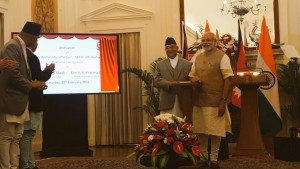Ending months of drift and “misunderstandings,” India and Nepal have put a period of enormous stress in bilateral ties behind by signing nine pacts encompassing diverse sectors during Prime Minister K.P. Oli’s recent visit to India.
India’s Prime Minister Narendra Modi held wide-ranging talks with his Nepali counterpart K.P. Sharma Oli in New Delhi on February 20, with the political and economic situation in the Himalayan state topping the agenda. Mr Oli’s six-day visit to India began from February 19.
The talks cleared “misunderstandings” between the two countries over the past few months, said Mr Oli. “The misunderstanding that persisted in the last few months is no longer there. I believe our relationship will greatly benefit from our discussions. It is high time to look at India-Nepal relations with a forward-looking approach in the interest of the two countries and their people.”
Mr Modi described Nepal’s constitution as a “major achievement”, but underlined that its success depends on “consensus and dialogue”. “The announcement of the new constitution in Nepal came after decades of struggle there… I appreciate the contribution of the political leadership and people of Nepal for it… But its success depends on consensus and dialogue. I am confident on the basis of these principles and through political dialogue and by taking all sections together, you (Oli) will be able to resolve all issues relating to the constitution satisfactorily and take Nepal forward towards the path of development and stability.”
Madhesi parties had launched agitation against some aspects of Nepal’s constitution to protest against what they saw as some of its discriminatory provisions, leading to an imposition of blockade of goods entering Nepal from India. The Nepal government has amended the constitution to address their key demands, leading to the lifting of the blockade and paving the way for Mr Oli’s visit to India.
With Mr Oil’s visit, bilateral ties are back on track. India and Nepal signed a pact on utilization of US$ 250 million grant component of India’s assistance package for post-earthquake reconstruction assistance. According to the agreement, four sectors namely housing, health, education and cultural heritage have been identified. Of the US$250 million, around US$100 million would be utilised for construction of 50,000 houses in 14 severely earthquake affected districts and US$ 50 million each would be utilised in health, education and cultural heritage sectors in 31 earthquake affected districts of Nepal.
A Memorandum of Understanding (MoU) on strengthening of road infrastructure in the Terai region of Nepal was signed. As per the agreement, it will enable speedy implementation of remaining work on 17 Roads in Package 2, 3, 4, 5 and 6 of the Terai Road Phase-I project. The road will span 518 km. Two roads in Package 1 totalling 87 kms have already been completed.
Bolstering cultural linkages, the Nepal Academy of Music and Drama and Sangeet Natak Academy inked a pact on performing arts through exchanges of experts, exponents, dancers, scholars and intellectuals.
The two countries also exchanged letters on transit routes. The exchange of letters between India and Nepal would result in simplification of modalities for traffic of goods between Nepal and Bangladesh while transiting through India. This would be through the Kakarbhitta (Nepal) and Banglabandha (Bangladesh) corridor.
The exchange of letters would provide transit facilities for Nepal through the Vishakhapatnam port. India and Nepal also exchanged letters on Rail transport which would allow for rail transport to and from Vishakhapatnam to Nepal. The agreement would also help operationalise the rail transit facility through Singabad in India for Nepal’s trade with and through Bangladesh.
The Muzaffarpur-Dhalkebar transmission line would also be inaugurated. The Nepal portion of the 400 KV Muzaffarpur-Dhalkebar transmission line is being implemented by the Government of Nepal under an LoC of US$ 13.5 million. As per the agreement 80 MW power would flow immediately through this line, with an initial charge of 132 KV. After that it will be augmented to 200 MW in October 2016 at 220 KV, and then to 600 MW by December 2017 at 400 KV.
Looking ahead, the two countries agreed to set up an Eminent Persons group that would comprehensively review bilateral relations and recommend measures including institutional frameworks to further enhance bilateral ties. India and Nepal would nominate four members each which would include preferably a parliamentarian, a lawyer, an economist and a civil society activist.
Author Profile
- India Writes Network (www.indiawrites.org) is an emerging think tank and a media-publishing company focused on international affairs & the India Story. Centre for Global India Insights is the research arm of India Writes Network. To subscribe to India and the World, write to editor@indiawrites.org. A venture of TGII Media Private Limited, a leading media, publishing and consultancy company, IWN has carved a niche for balanced and exhaustive reporting and analysis of international affairs. Eminent personalities, politicians, diplomats, authors, strategy gurus and news-makers have contributed to India Writes Network, as also “India and the World,” a magazine focused on global affairs.
Latest entries
 DiplomacyJanuary 5, 2026India walks diplomatic tightrope over US operation in Venezuela
DiplomacyJanuary 5, 2026India walks diplomatic tightrope over US operation in Venezuela India and the WorldNovember 26, 2025G20@20: Africa’s Moment – The Once and Future World Order
India and the WorldNovember 26, 2025G20@20: Africa’s Moment – The Once and Future World Order DiplomacyOctober 4, 2025UNGA Resolution 2758 Must Not Be Distorted, One-China Principle Brooks No Challenge
DiplomacyOctober 4, 2025UNGA Resolution 2758 Must Not Be Distorted, One-China Principle Brooks No Challenge India and the WorldJuly 26, 2025MPs, diplomats laud Operation Sindoor, call for national unity to combat Pakistan-sponsored terror
India and the WorldJuly 26, 2025MPs, diplomats laud Operation Sindoor, call for national unity to combat Pakistan-sponsored terror








